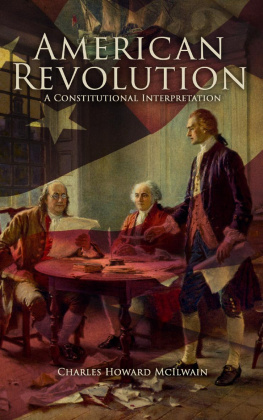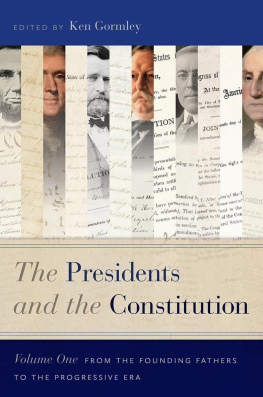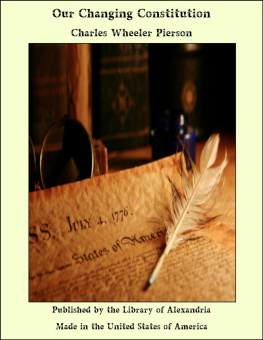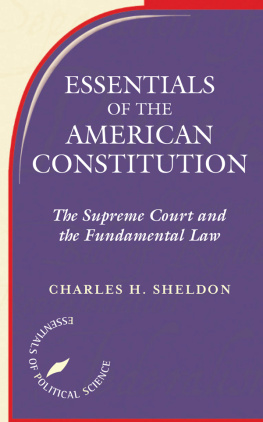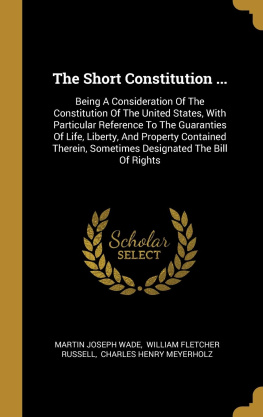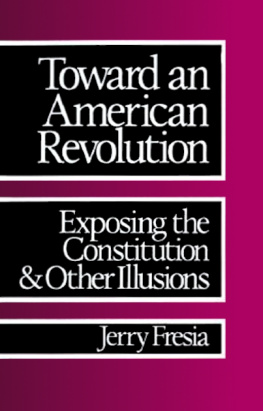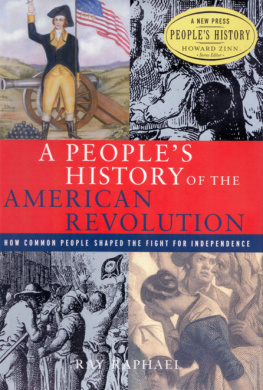PREFACE
This little book was finished before Political Ideas of the American Revolution, by Professor Randolph Greenfield Adams (Durham, N. G, 1922), came into my hands, hence this is my only opportunity of expressing my pleasure at the corroboration of the views set forth here by the work of another student who has reached the same general conclusion from another starting point and by a wholly different path. Professor Adamss point of view is political; that of this essay is constitutional. I have dealt mainly with precedents; he was largely concerned with contemporary American statements of the imperial problem of the eighteenth century, and the fullness and adequacy of his treatment of the latter make me very glad I decided originally not to take them up in detail. As it happens, therefore, we have traversed ground almost entirely different, and our minor deductions vary widely; but, I take it, our main conclusions are practically identical: that the central problem of the American Revolution was the true constitution of the Empire.
I am aware, of course, that by some it is regarded as wholly idle to discuss the constitutional issues involved in the American Revolution from any point of view. Independence was inevitable if not foreordained. Had it not occurred when it did and as it did, it must have come sooner or later in some way or other. The forces of nationalism were making it inevitable long before 1774 and it is a waste of time to try to discover the particular constitutional issues on which the actual breach happened to be made. In answer to such a view, while conscious of the great importance of the nationalistic forces in our history, I can only say in general that for the inevitable character of historical events as a theory I have not the very highest regard; and, more specifically, that of nationalistic characteristics in the thirteen colonies making independence inevitable in 1774, I can see few that do not seem equally discoverable in Upper Canada about 1837. Inevitable results in history, like exclusively racial explanations of it, are about the last resort of the despairing historian.
Discussions with my colleagues, Professor Wilbur C. Abbott and Dr. Frederick Merk on the topics treated here have been of great service in clarifying my ideas about them, and in addition I am greatly indebted to Dr. Merk and to my wife for valuable suggestions as to the form and manner of treatment to be followed.
Cambridge, Mass.
C. H. McIlwain.
CHAPTER I
INTRODUCTORYTHE PROBLEM
The American Revolution began and ended with the political act or acts by which British sovereignty over the thirteen English colonies in North America was definitely repudiated. All else was nothing but cause or effect of this act. Of the causes, some were economic, some social, others constitutional. But the Revolution itself was none of these; not social, nor economic, nor even constitutional; it was a political act, and such an act cannot be both constitutional and revolutionary; the terms are mutually exclusive. So long as American opposition to alleged grievances was constitutional it was in no sense revolutionary. The moment it became revolutionary it ceased to be constitutional. When was that moment reached? The Americans stoutly insisted during the whole of their contest with Parliament to the summer of 1776 that their resistance was a constitutional resistance to unconstitutional acts. If their claim was justified the American Revolution can hardly be said to have occurred much before May, 1776. For it was the basis of the contemporary American contention that Parliament could constitutionally pass no act affecting the internal polity of the colonies, and hence no colonial opposition to such acts could be revolutionary. Only when the opposition was turned against an authority that was constitutional could this opposition be truly revolutionary; and for the Americans there was but one such authority, not the Parliament but the Crown. For them, therefore, the struggle continued to be merely a constitutional struggle for the recovery of legal rights and the redress of illegal wrongs up to the point where the power of the Crown was touched. The basis of their contention was a clear-cut distinction between the King in Parliament and the King out of Parliament, and so late as October 26, 1774, they solemnly assured George III that they wished not a diminution of the prerogative.
On the other hand it can scarcely be expected that English statesmen who had declared in the solemn form of a statute that the English Parliament had, hath, and of right ought to have sufficient power and authority to bind the American colonies, subjects of the Crown of Great Britain in all cases whatsoever, would regard American opposition to Parliaments practical application of this power in such statutes as the Massachusetts Government Act as a merely constitutional opposition, or their resistance to its enforcement as anything less than revolutionary. For these English statesmen, the Revolution of 1688-9 had ended the older sharp distinction between the King in Parliament and the King out of Parliament. Prerogative had become for them only such part of the ancient discretionary right of the Crown as Parliament saw fit to leave untouched. All rights of the Crown in the dominions, as well as in the Realm, were now completely under the control of Parliament, since William and Mary had sworn in their coronation oath to govern the Kingdom and the dominions thereunto belonging according to the statutes in Parliament agreed on.
On this interpretation it is obvious that the acts of the Americans had ceased to be constitutional and became revolutionary in character long before they ceased to protest their loyalty to the best of Kings. They must be considered so from the first time the power of Parliament constitutionally to bind the colonies was definitely denied. This occurred long before 1776.
The bare statement of these two inconsistent and conflicting views at once suggests the first constitutional problem. When did the first revolutionary act occur? What is the date of the American Revolution? Is it coincident with the first definite breach of the royal prerogative, or should it be found in the earlier repudiation of Parliaments authority? No answer can possibly be made to this important question one way or the other till the conflicting constitutional views of the Americans and the English Parliament are carefully compared and some conclusion reached on their respective merits; and this conclusion itself must be based upon the constitutional precedents to be found in the whole historical development of the English constitution up to the time of the American struggle.
When did the train of constitutional development begin which led in continuous sequence to the first act that may be called revolutionary? Who were the real adversaries in this constitutional struggle, and which of them was constitutionally right? These are a few of the questions that occur to one who attempts to make a general survey of this period. The answers they have received are singularly contradictory and frequently unconvincing, and this after all the painstaking research of recent years. The purpose of this brief study is to try if possible to narrow these constitutional questions until they become susceptible of clear and definite treatment, if not of conclusive answers. We shall not be concerned with the intricate network of causes, economic, social, or political, tremendous as is the importance of them all. They must be at the background of our minds, not the foreground.



